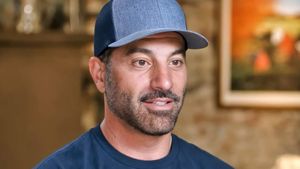CONTACTAbout UsCAREER OPPORTUNITIESADVERTISE WITH USPRIVACY POLICYPRIVACY PREFERENCESTERMS OF USELEGAL NOTICE
© 2025 Equal Entertainment LLC.
All Rights reserved
All Rights reserved
By continuing to use our site, you agree to our Privacy Policy and Terms of Use.
We need your help
Your support makes The Advocate's original LGBTQ+ reporting possible. Become a member today to help us continue this work.
Your support makes The Advocate's original LGBTQ+ reporting possible. Become a member today to help us continue this work.
Accustomed to neglect from much of the medical establishment, lesbians in San Francisco are assigning themselves the task of assessing--often bluntly--their distinctive array of health problems. Even without a specific crisis as grave as the AIDS epidemic, the diagnosis is sobering: Compared with heterosexual women, lesbians appear to have higher rates of smoking, obesity, and alcohol use. Sometimes lacking health insurance or wary of unsympathetic doctors, they also may be less likely to undergo routine medical exams that could identify cancer and other problems at early stages. Complicating all these factors, researchers say, is a glaring shortage of comprehensive data, resulting from the fact that most health surveys--as well as death certificates--don't account for sexual orientation. "We don't know the mortality rates, we don't know the suicide rates," said Dr. Patricia Robertson of the University of California, San Francisco, School of Medicine. "Lesbians are invisible." Robertson is codirector of UCSF's Lesbian Health Research Center, founded in 1999 to fill the perceived void in the study of lesbians' medical problems. Other relatively new organizations have undertaken similar efforts, including the San Francisco-based Lesbian Health Fund and the Washington, D.C.-based Mautner Project, which focuses on lesbians with cancer. A national conference on lesbian health was held in Chicago last month. Several researchers said in interviews that they were derided by some colleagues for entering the field and still encounter skepticism, both within the medical profession and among Bush administration officials who influence priorities for federal health grants. "Only just recently has there been a feeling that lesbian health is a legitimate specialty, but you still face inequities in funding," said Dixie Horning, executive director of UCSF's National Center for Excellence in Women's Health. Robertson, in a pattern she says is common among lesbian researchers, performs most of her research and advocacy work on a volunteer basis while earning a living as an obstetrician. The general attitude--at the research center and among its allies--is that important research might not get done unless lesbians do it themselves. One challenge for all those concerned with lesbian health is that the problems they confront are more subtle than those facing gay men. "In the gay men's community, most of the issues relate to sexually transmitted disease--it's absolutely clear what kind of health risk it poses," said Susan Cochran, an epidemiologist at UCLA. For the activist researchers and groups like the Mautner Project, their work involves a balancing act: conveying concern without fueling negative stereotypes. Many lesbians are in excellent health and, particularly if affluent or well-insured, readily find doctors they like. "What we want to do is make sure we're all living as healthily as possible," said Cheryl Pearson-Fields of the Mautner Project. "You're focusing on the things that lead to negative health outcomes, and the message can seem very negative." She said smoking and substance abuse, to the extent they are more prevalent among lesbians, may be linked to the stress of feeling targeted by prejudice. Changing the attitudes of lesbians themselves is another challenge. Cochran said many get checkups far less frequently than heterosexual women who see doctors for contraceptive advice, prenatal care, and postnatal care. "Most women are brought into a health-care setting on a regular basis," Cochran said. "Men go in when something goes wrong, and in some ways lesbians are like that." When a lesbian does make an initial visit to a gynecologist, the doctor often assumes the patient is heterosexual and asks what birth control method she uses. "That puts you off right to begin with," said Marion Kavanaugh-Lynch, vice president of the Lesbian Health Fund. "It shouldn't be up to a patient to correct an assumption; the assumption shouldn't be made in the first place." Such encounters compel lesbians to decide on the spot whether to disclose their sexual orientation. "Every time you face that situation, you ask yourself, 'How will this person react?"' Kavanaugh-Lynch said. Lisa Pratt, medical director at the Lyon-Martin women's clinic in San Francisco, said some lesbians balk at confiding in a doctor even if candor might aid a diagnosis. "There's a vulnerability disclosing information to someone you don't really know," she said. "Too often the patriarchal white-coated physician doesn't engender that trust." The Gay and Lesbian Medical Association has compiled a national database of physicians who depict themselves as sensitive to the health concerns of gays and lesbians. "The number is awfully small in some states," Kavanaugh-Lynch said. Advocacy groups are working with hospitals and medical schools to provide training on how to deal empathetically with lesbian health issues. Because many lesbians get examined less frequently than other women--and because of the relatively high smoking, drinking, and obesity rates--there is widespread suspicion that they get breast and cervical cancer more often or start treatment later. They also are less likely to bear children before age 30, missing out on the breast-feeding that reduces the risk of breast cancer. "We don't know a whole lot more than that," said Kavanaugh-Lynch, a breast cancer specialist. "It's going to be at least a decade before the research is clear." In the short term, researchers and activists seek to encourage a self-help mentality. They say some lesbians hesitate to enter weight-loss or quit-smoking programs where heterosexual women predominate, and some have been conditioned to be disinterested in fitness. "So many lesbians get the message from their families, 'You don't really matter because you're not going to give us grandchildren. We're not going to bother to ask you about your health,"' Robertson said. In some cases, a tendency toward obesity may be linked to a rejection of the sleek, sexy images of women that abound in the mass media. "Many lesbians choose to push that image aside," Horning said. "They want to look like they want to look, do what they want to do, and not fit Madison Avenue's stereotype." Obesity, diabetes, and cardiovascular problems are widespread among black lesbians, "but we're not seen as a group that needs to be taken seriously," said Brenda Crawford, who coordinates health-awareness programs for minorities in Oakland, Calif. Nationally, lesbian researchers are asking federal agencies to ensure that sexual orientation is included more often among questions asked in major health studies. "We've gotten sick of having to give talks without data," Robertson said. "There's so much that needs to be done, and not enough funding. Our community is not being respected in terms of studying health."
From our Sponsors
Most Popular
Bizarre Epstein files reference to Trump, Putin, and oral sex with ‘Bubba’ draws scrutiny in Congress
November 14 2025 4:08 PM
True
Jeffrey Epstein’s brother says the ‘Bubba’ mentioned in Trump oral sex email is not Bill Clinton
November 16 2025 9:15 AM
True
Watch Now: Pride Today
Latest Stories
Health policy expert to RFK Jr.: You can't ban trans youth care this way
December 18 2025 5:37 PM
12 lesbian thrillers and mysteries to binge & where to watch them
December 18 2025 4:36 PM
Netflix's 'Boots' season 2 plot revealed by producer amid cancelation
December 18 2025 4:33 PM
Charlie Kirk's accused killer, Tyler Robinson, on LGBTQ+ issues: It's complicated
December 18 2025 4:04 PM
Sacramento man still in coma six weeks after suspected anti-LGBTQ+ hate crime
December 18 2025 1:17 PM
RFK Jr. and Dr. Oz announce sweeping measures to ban gender-affirming care for trans youth
December 18 2025 12:19 PM
True
Texas city will remove rainbow crosswalks under orders from Trump administration
December 18 2025 11:07 AM
Six key takeaways from Trump's speech to the nation, including 'transgender for everybody'
December 17 2025 10:51 PM
Marjorie Taylor Greene’s bill criminalizing gender-affirming care for minors passes with Democrats’ support
December 17 2025 6:47 PM
True
I didn’t just run the world’s major marathons. I changed them
December 17 2025 4:31 PM
Pam Bondi wants FBI to offer bounties for ‘radical gender ideology’ groups, leaked memo shows
December 17 2025 3:17 PM
Trending stories
Recommended Stories for You




































































Charlie Kirk DID say stoning gay people was the 'perfect law' — and these other heinous quotes